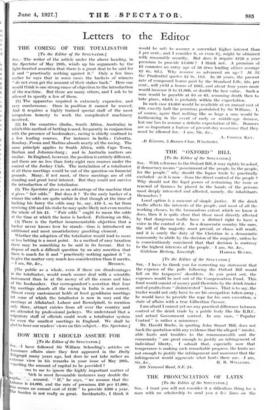HOW MUCH I SHOULD ASSURE FOR [To the Editor of
the SPECTATOR.] 8111,—I have followed Sir William Schooling's articles on Assurance affairs since they first appeared in the Daily Telegraph many years ago, but does he not take rather an extreme view in his remarks in your issue of May 28th, '^earding the amount of capital .to be provided ?
'ma to me to ignore the highly important matter of Kiel in most favourable instances may double the
Pita. assured. " if," he says, " we assume that the lance is £4,000, and the rate of premium £80 per £1,000, his means an annual cost of £120 " to provide £200 a year. e burden is -not -really -So great. Incidentally, I think it would be safe • to assume a somewhat higher interest than 5 per cent., and I consider 6, or even 64, might be obtained with reasonable security. But does it require £120 a year premium to provide 14,000 ? I think not. A premium of £8 connotes an entry age of 38 (two leading offices average 13 Os. Cid.). Why assume so advanced an age ? At 32 the Prudential quotes £2 9s. lid. In 30 years, the present rate of compound bonus paid by the Standard Life, 42s. per cent., will yield a bonus of £865, and about four years more would increase it to £1,000, or double the face value. Such a sum would be payable at 04 or 65, assuming death then to take place, which is probably within the expectation.
In such case £4,000 would be available at an annual cost of £60, exactly half the premium postulated by Sir William. I, of course, agree that nothing- like so large a sum would be forthcoming in the event of early or middle-age decease, but one has to assume a definite expectation of life. Bonuses are so important a feature of present-day assurance that they must be allowed for.—I am, Sir, &c.,
A. Coornit Kr:v. At Kinross, 5 Barnes (lose, Winchester.






































 Previous page
Previous page